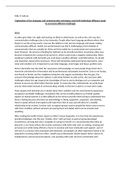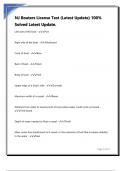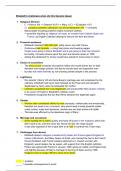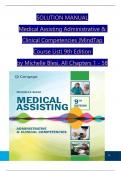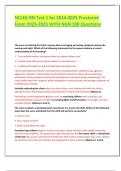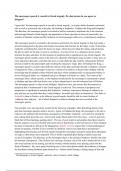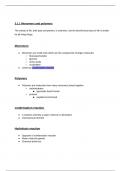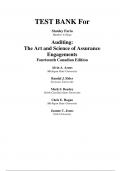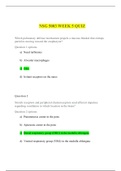Milly O’Sullivan
Explanation of the strategies and communication techniques used with individuals different needs
to overcome different challenges
Aisha
As Aisha gets older, her sight and hearing are likely to deteriorate. As well as this, she may face
communication challenges due to her dementia. People often have language problems where they
forget or use the wrong words, may lose the ability to read, process language and speak, making
communication difficult. Health care professionals may find it challenging to find methods of
communication that are suitable for Aisha and that enable her to understand and communicate
back. However, the process of finding the method can be stressful and time consuming; Aisha may
become irritated by the constant trial and error, which could create a negative relationship. When
speaking to patients with dementia you must keep a positive attitude, avoid distractions, be simple
and respectful, repeat when necessary. Those with dementia understand facial expressions, voice
tones and emotion so it is important to use body language, avoid anger and keep a positive tone.
Aisha’s dementia may also limit her awareness and knowledge as most people forget short-term
memories and therefore information told by professionals and people around her. Due to not having
any friends or family, and her neighbour being the only regular socialisation that she gets, the
amount of knowledge about her options is extremely limited. As well as this, she may have skills
challenges where her age impacts her knowledge of how to use technology such as computers and
phones to access any information that she needs. To overcome this, professionals can write down
any key information instead of communicating verbally so that she is able to re-read notes made.
Many people with dementia are in denial about their condition and she may therefore experience
acceptance and belief challenges. Sometimes this can be a healthy defence as it blocks painful
aspects of reality however it is often difficult on the service provider when trying to understand how
Aisha is feeling because she does not acknowledge it. Being supportive, respectful, and allowing
them to speak without interruptions will make them feel at ease and will allow for a healthy
relationship to be created. Services such as support groups may let people like Aisha come to terms
with their condition without someone pressuring them into belief which can be stressful and
upsetting.
After reading the health visitors report on Aisha’s house inspection, it is clear that she experiences
practical challenges. Her flat was “chaotic, dirty” with no food, as well as having developed
incontinence, proving that she is incapable of caring for herself. It is recommended that Aisha be
placed in a care home where she receives assistance with daily tasks such as cooking, cleaning and
personal care whilst being offered a chance to socialise and have medication and support. Lack of
self-care is a common trait associated with dementia, and people can often experience denial or be
opposed to receiving help from others. Health care professionals should respect Aisha’s desire for
independence and personal boundaries, only assisting with tasks she feels comfortable with.
,Valarie
Valarie has an untreated hearing impairment meaning she will often experience communication
complications such as misinterpretation or mishearing which can have significant impact if the
information being told is important. Good communication can be achieved by maintaining eye
contact, keeping your face visible, speaking naturally but clearly (no exaggeration), repeating then
rephrasing, and reduced background noise. This enables Valarie to feel comfortable when
communicating with professionals as they can adapt to meet her needs. She will be informed and
aware of what her treatment is, the benefits and the possible side effects whilst giving her an
opportunity to ask questions.
Being unemployed and receiving benefits may mean that Valarie only spend money on necessary
items such as electricity, rent, food and water. She may not have access to the internet where she
will find information about her condition, therefore having awareness and knowledge challenges.
Living alone and having low self-esteem limits the opportunity for her to ask others any questions
she has. This can also be applied to her obesity as well as her burst appendix; knowing that she
needs to lose weight in order to be healthy but not knowing how or what support is available. Losing
weight has physical effects - less health complications, healthy diet and being stronger, as well as
mental effects - more confidence, reduced mental health issues. She could also lack the skills needed
to research.
Many mental health issues cause practical challenges where people feel so “weak” and demotivated
to complete daily tasks such as cooking, cleaning and personal hygiene. Valarie may feel that she
needs to be supported when completing these tasks to ensure that she does it and can build her
confidence. There can be support groups offered by service providers that allow for people with
similar experiences to meet and share their struggles and recommendations whilst meeting new
people which may be beneficial to Valarie. Maintaining a form of self-care regularly (baths,
meditation, exercise...) creates a better mood, quality of life and self-esteem.
Her mental health problems can impact her motivation and belief in herself, feeling that she can no
longer perform simple tasks forcing her to rely on someone else and lose her independence. Her low
motivation can be apparent when avoiding losing weight which would improve her physical and
mental wellbeing. Professionals must be aware of this and should withhold a conversation using
positive body language and tone as Valarie could be more sensitive and take it personally, reducing
her confidence further.
Methods of identifying challenges
Observation:
Observation is constantly using your senses combined with your knowledge of the patient to
monitor any changes to their health or social wellbeing. This helps you quickly identify problems that
can be addressed before escalating. Service user’s patterns of behaviour can be identified as changes
may point to a developing problem. Objective observation is visible and measurable signs including
monitoring breathing, blood pressure and temperature. Subjective observation are signs that can’t
be measured and are usually verbally communicated from the adult
, Using objective observation with Aisha would be suitable as you are able to identify any changes
without her verbally communicating, which is something she may struggle with due to her dementia.
Recording her vital signs initially (baseline observations) and then comparing these throughout the
treatment at the community hospital allows professionals to identify any changes to her health
conditions and report any symptoms that may indicate a new condition or a deterioration of her
current one. Being admitted to the community hospital for pneumonia means that the service
provider’s must closely monitor her temperature to ensure that it is rising steadily towards the
average (37°C). As dementia changes the behaviour of individuals including their judgement, mood,
thinking skills, memory skills and language, professionals must observe any changes in her actions to
monitor the syndrome’s development and effect. As it worsens, they may have to increase her
medication and other treatment, so it is important that it is monitored. I therefore believe this was
successful as professionals working with Aisha get to know her behaviour and they are able to
monitor, prevent or adapt to any changes that may occur.
Observing a baseline of Valarie’s vital signs such as blood pressure and breathing can be used as a
comparison throughout her treatment. As people with obesity are prone to get other health
conditions such as type 2 diabetes and heart disease, it is important to regularly monitor to ensure
that nothing is worsening. Observations enable professionals to quickly treat and possibly remove an
issue if it occurs, disallowing it to develop into something more serious. It is also important to note
that many people with obesity have high blood pressure and may have Obesity Hypertension
Syndrome (OHS) meaning that their body doesn’t have enough oxygen. Valarie also has a burst
appendix which often causes a fever and increased heart rate, so it is important to monitor these to
ensure it is under control. Observing Valarie’s behaviour can help professionals know when she is
experiencing times with significantly low self-esteem and is struggling with her mental health,
noticing patterns of when she is feeling like this can be used to provide additional services such as
support groups, counselling or complimenting her. I believe this was successful since they are able to
compare Valarie when she is healthy to when she is struggling mentally or physically and support her
when finding a problem, making her feel valued and cared for.
Focus groups:
A focus group is a small group of people assembled to discuss an issue, share ideas to clarify
situations and identify challenges. A famous Health and Social Care focus group led by Carol
McCloskey, a counsellor and health services researcher for the NHS. They work with professional
bodies, NHS trusts, hospices, charities, and patient groups to discuss many topics to raise public
awareness and gain a deeper insight.
Aisha has no family or friends, with her neighbour being the only person she talks to. Having a focus
group where she is able to meet new people and talk about issues and situations that they are all
facing, finding a common interest, enabling her to form a support network. She could meet with
professionals and other dementia and/or pneumonia patients to ask questions, share experiences
and for the service providers to explain options of treatment and services available. Nurses can use
this opportunity to see how Aisha is finding her treatment, if she is aware of future plans and to gain
feedback on what they could improve on. A group setting may be more comfortable for Aisha and
being socially engaged can slow deterioration of brain activity but may be challenging as she is used
to being alone. This was successful although Aisha felt challenged by the social interaction. She felt
part of a group and was given an opportunity to talk to other’s in similar conditions whilst providing
the service provider’s with key information to assist her treatment.
Explanation of the strategies and communication techniques used with individuals different needs
to overcome different challenges
Aisha
As Aisha gets older, her sight and hearing are likely to deteriorate. As well as this, she may face
communication challenges due to her dementia. People often have language problems where they
forget or use the wrong words, may lose the ability to read, process language and speak, making
communication difficult. Health care professionals may find it challenging to find methods of
communication that are suitable for Aisha and that enable her to understand and communicate
back. However, the process of finding the method can be stressful and time consuming; Aisha may
become irritated by the constant trial and error, which could create a negative relationship. When
speaking to patients with dementia you must keep a positive attitude, avoid distractions, be simple
and respectful, repeat when necessary. Those with dementia understand facial expressions, voice
tones and emotion so it is important to use body language, avoid anger and keep a positive tone.
Aisha’s dementia may also limit her awareness and knowledge as most people forget short-term
memories and therefore information told by professionals and people around her. Due to not having
any friends or family, and her neighbour being the only regular socialisation that she gets, the
amount of knowledge about her options is extremely limited. As well as this, she may have skills
challenges where her age impacts her knowledge of how to use technology such as computers and
phones to access any information that she needs. To overcome this, professionals can write down
any key information instead of communicating verbally so that she is able to re-read notes made.
Many people with dementia are in denial about their condition and she may therefore experience
acceptance and belief challenges. Sometimes this can be a healthy defence as it blocks painful
aspects of reality however it is often difficult on the service provider when trying to understand how
Aisha is feeling because she does not acknowledge it. Being supportive, respectful, and allowing
them to speak without interruptions will make them feel at ease and will allow for a healthy
relationship to be created. Services such as support groups may let people like Aisha come to terms
with their condition without someone pressuring them into belief which can be stressful and
upsetting.
After reading the health visitors report on Aisha’s house inspection, it is clear that she experiences
practical challenges. Her flat was “chaotic, dirty” with no food, as well as having developed
incontinence, proving that she is incapable of caring for herself. It is recommended that Aisha be
placed in a care home where she receives assistance with daily tasks such as cooking, cleaning and
personal care whilst being offered a chance to socialise and have medication and support. Lack of
self-care is a common trait associated with dementia, and people can often experience denial or be
opposed to receiving help from others. Health care professionals should respect Aisha’s desire for
independence and personal boundaries, only assisting with tasks she feels comfortable with.
,Valarie
Valarie has an untreated hearing impairment meaning she will often experience communication
complications such as misinterpretation or mishearing which can have significant impact if the
information being told is important. Good communication can be achieved by maintaining eye
contact, keeping your face visible, speaking naturally but clearly (no exaggeration), repeating then
rephrasing, and reduced background noise. This enables Valarie to feel comfortable when
communicating with professionals as they can adapt to meet her needs. She will be informed and
aware of what her treatment is, the benefits and the possible side effects whilst giving her an
opportunity to ask questions.
Being unemployed and receiving benefits may mean that Valarie only spend money on necessary
items such as electricity, rent, food and water. She may not have access to the internet where she
will find information about her condition, therefore having awareness and knowledge challenges.
Living alone and having low self-esteem limits the opportunity for her to ask others any questions
she has. This can also be applied to her obesity as well as her burst appendix; knowing that she
needs to lose weight in order to be healthy but not knowing how or what support is available. Losing
weight has physical effects - less health complications, healthy diet and being stronger, as well as
mental effects - more confidence, reduced mental health issues. She could also lack the skills needed
to research.
Many mental health issues cause practical challenges where people feel so “weak” and demotivated
to complete daily tasks such as cooking, cleaning and personal hygiene. Valarie may feel that she
needs to be supported when completing these tasks to ensure that she does it and can build her
confidence. There can be support groups offered by service providers that allow for people with
similar experiences to meet and share their struggles and recommendations whilst meeting new
people which may be beneficial to Valarie. Maintaining a form of self-care regularly (baths,
meditation, exercise...) creates a better mood, quality of life and self-esteem.
Her mental health problems can impact her motivation and belief in herself, feeling that she can no
longer perform simple tasks forcing her to rely on someone else and lose her independence. Her low
motivation can be apparent when avoiding losing weight which would improve her physical and
mental wellbeing. Professionals must be aware of this and should withhold a conversation using
positive body language and tone as Valarie could be more sensitive and take it personally, reducing
her confidence further.
Methods of identifying challenges
Observation:
Observation is constantly using your senses combined with your knowledge of the patient to
monitor any changes to their health or social wellbeing. This helps you quickly identify problems that
can be addressed before escalating. Service user’s patterns of behaviour can be identified as changes
may point to a developing problem. Objective observation is visible and measurable signs including
monitoring breathing, blood pressure and temperature. Subjective observation are signs that can’t
be measured and are usually verbally communicated from the adult
, Using objective observation with Aisha would be suitable as you are able to identify any changes
without her verbally communicating, which is something she may struggle with due to her dementia.
Recording her vital signs initially (baseline observations) and then comparing these throughout the
treatment at the community hospital allows professionals to identify any changes to her health
conditions and report any symptoms that may indicate a new condition or a deterioration of her
current one. Being admitted to the community hospital for pneumonia means that the service
provider’s must closely monitor her temperature to ensure that it is rising steadily towards the
average (37°C). As dementia changes the behaviour of individuals including their judgement, mood,
thinking skills, memory skills and language, professionals must observe any changes in her actions to
monitor the syndrome’s development and effect. As it worsens, they may have to increase her
medication and other treatment, so it is important that it is monitored. I therefore believe this was
successful as professionals working with Aisha get to know her behaviour and they are able to
monitor, prevent or adapt to any changes that may occur.
Observing a baseline of Valarie’s vital signs such as blood pressure and breathing can be used as a
comparison throughout her treatment. As people with obesity are prone to get other health
conditions such as type 2 diabetes and heart disease, it is important to regularly monitor to ensure
that nothing is worsening. Observations enable professionals to quickly treat and possibly remove an
issue if it occurs, disallowing it to develop into something more serious. It is also important to note
that many people with obesity have high blood pressure and may have Obesity Hypertension
Syndrome (OHS) meaning that their body doesn’t have enough oxygen. Valarie also has a burst
appendix which often causes a fever and increased heart rate, so it is important to monitor these to
ensure it is under control. Observing Valarie’s behaviour can help professionals know when she is
experiencing times with significantly low self-esteem and is struggling with her mental health,
noticing patterns of when she is feeling like this can be used to provide additional services such as
support groups, counselling or complimenting her. I believe this was successful since they are able to
compare Valarie when she is healthy to when she is struggling mentally or physically and support her
when finding a problem, making her feel valued and cared for.
Focus groups:
A focus group is a small group of people assembled to discuss an issue, share ideas to clarify
situations and identify challenges. A famous Health and Social Care focus group led by Carol
McCloskey, a counsellor and health services researcher for the NHS. They work with professional
bodies, NHS trusts, hospices, charities, and patient groups to discuss many topics to raise public
awareness and gain a deeper insight.
Aisha has no family or friends, with her neighbour being the only person she talks to. Having a focus
group where she is able to meet new people and talk about issues and situations that they are all
facing, finding a common interest, enabling her to form a support network. She could meet with
professionals and other dementia and/or pneumonia patients to ask questions, share experiences
and for the service providers to explain options of treatment and services available. Nurses can use
this opportunity to see how Aisha is finding her treatment, if she is aware of future plans and to gain
feedback on what they could improve on. A group setting may be more comfortable for Aisha and
being socially engaged can slow deterioration of brain activity but may be challenging as she is used
to being alone. This was successful although Aisha felt challenged by the social interaction. She felt
part of a group and was given an opportunity to talk to other’s in similar conditions whilst providing
the service provider’s with key information to assist her treatment.

